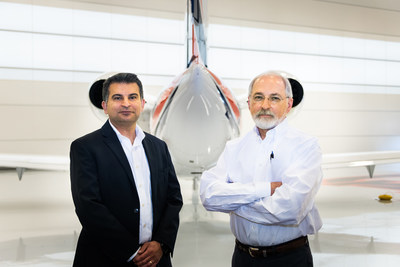The project involves fabricating metal parts from multiple industrial-scale metal 3D printers. It aims to specifically address issues related to understanding the variability in performance of the same parts made on different machines, as well as issues related to understanding how microscopic features in the 3D-printed metal affect overall fatigue and fracture properties. Both are key areas in the development of additive manufacturing (AM) specifications that the FAA wants to eventually apply in commercial airlines.
"This is what I call the 'Achilles heel' of additive manufacturing," said NCAME director Nima Shamsaei, Philpott-WestPoint Stevens Distinguished Associate Professor of mechanical engineering. "Such variations make the qualification and certification of AM materials and parts challenging."
The FAA said the partnership is ultimately intended to improve safety by standardizing certification of existing and emerging structural applications of advanced materials, a research area in which NCAME quickly emerged as an international leader, especially in the area of materials used for spaceflight.
Established in 2017 through a public-private partnership between Auburn and NASA, NCAME is also one of the founding partners of the ASTM International Additive Manufacturing Center of Excellence, which aims to close AM standards and workforce gaps.
"By understanding the sources of variability, controlling them, or accounting for them, we can generate more reliable materials data, and more reliable AM products," said Shamsaei, who serves as co-principle investigator (PI) on the project.
Co-PI Steve Taylor, associate dean for research, agrees.
"By teaming our faculty, who are global leaders in research on additively manufactured metal components, with the top engineers and scientists at FAA, we are confident that we can develop new knowledge that will help engineers design safer, more efficient aircraft," Taylor said. "Auburn University is honored to be collaborating with the FAA."
Other investigators on the project include Shuai Shao, associate professor of mechanical engineering; Hareesh Tippur, McWane Professor of mechanical engineering; Nick Tsolas, assistant professor of mechanical engineering; Jeff Suhling, chair of the Department of Mechanical Engineering; Masoud Mahjouri-Samani, assistant professor of electrical and computer engineering; Alex Vinel, assistant professor of industrial and systems engineering; Daniel Silva, assistant professor of industrial and systems engineering; and Jia (Peter) Liu, assistant professor of industrial and systems engineering. Mike Ogles, director of NASA Programs, serves as project manager.
About the Samuel Ginn College of Engineering
The Samuel Ginn College of Engineering at Auburn University has a long and rich tradition of excellence in engineering education, consistently ranking among the top engineering institutions in the country. Auburn University is a nationally ranked land grant institution recognized for its commitment to world-class scholarship, interdisciplinary research with an elite, top-tier Carnegie R1 classification and an undergraduate education experience second to none. Auburn is home to more than 30,000 students, and its faculty and research partners collaborate to develop and deliver meaningful scholarship, science and technology-based advancements that meet pressing regional, national and global needs.
![]() View original content to download multimedia:
http://www.prnewswire.com/news-releases/faa-invests-3-million-in-auburn-university-additive-manufacturing-research-301115999.html
View original content to download multimedia:
http://www.prnewswire.com/news-releases/faa-invests-3-million-in-auburn-university-additive-manufacturing-research-301115999.html
SOURCE Auburn University-College of Engineering
| Contact: |
| Company Name: Auburn University-College of Engineering
Jeremy Henderson Email Contact 334-844-3591 Web: www.eng.auburn.edu |










